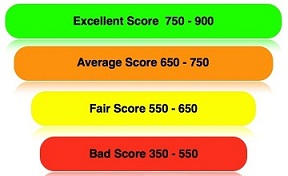You can be denied loan by the bank. Know why.

Mr. Verma works in export department in a reputed production company. He has been working there for seven years. Mr. Verma planned to buy a new car few days ago so he started visiting car showrooms. He was very confident of getting finance facility from all prominent banks as he earns handsome salary. The model was finalized and Mr. Verma submitted all his documents to the bank to get the car financed. Everything going fine turned miserable by a phone call from the bank informing Mr. Verma about rejection of his loan application. The bank rejected Mr. Verma’s loan application on the basis of negative CIBIL rating. Probably Mr. Verma heard about CIBIL first time when his loan was denied. There are thousands of people like Mr. Verma who carry negative CIBIL score and they become aware of it when their loan is rejected. In this post we will know what CIBIL is and how it can impact possibilities of availing any credit facility from any financial institution.
The Credit Information Bureau (India) Limited, better known as CIBIL, is a premier agency for providing credit reports and scores pertaining to individuals. CIBIL sources financial data of individuals such as loan and credit card information from leading banks and other financial institutions in India. This data is then presented in the form of a CIBIL credit report, also known as a Credit Information Report (CIR). CIBIL was incorporated in 2000 and has continued to expand its presence throughout the country. It is backed by TransUnion International and Dun and Bradstreet, which are major global credit bureaus and agencies.

CIBIL reports are generated on monthly basis and are updated on centralized system which can be accessed by all members through login id. CIBIL score is a numerical score of an individual which represents the credit worthiness of the individual. It includes all the details of the credit that you have acquired throughout the years. It also shows how much credit you have taken and how you have repaid it. It will also show if you have missed making any payments or if you have settled any loan. It contains your debt and repayment history along with all your relevant details.
CIBIL scores are calculated on the basis of at least 6 months of historical financial data of an individual. The data is fed into an algorithm with 258 different variables; each with a different weightage. The other credit rating agencies are Experian and Crif Highmark. All the agencies are approved by the Reserve Bank of India and offer credit report services to the banks and the other financial institutions.
What is a CIBIL Score?
A CIBIL Score is a numeric summary of credit history that is calculated based on the following factors:
- Track Record of Past Payments
- Record of all past repayments
- Consistently making payments on time leads to a higher score
- Delayed payments leads to a lower score
- Recent delayed payments makes a more negative impact
Previous Settlements, Defaults, Write-offs
- Recent write-offs impact more negatively than older ones
- Multiple write-offs lead to lower score
- Write offs documented by lenders on previous debts lower score
- Delays or defaults on secured loan repayments impact more negatively than unsecured loans
Loans as Proportion of Income
- Low loan balance indicative of healthy credit usage and thus higher score
- High loan balance reduces score
Secured Loans vs. Unsecured Loans and credit cards
- High credit card balances lower score
- Reliance on unsecured loans (credit cards) over secured loans viewed negatively
- Lesser number of such accounts coupled with frequent payment history pushes up score
Loan Equities
- Many loan enquiries to avail loans indicative of “credit hungry” behaviour, negatively impacts score
CIBIL Score Range

A CIBIL score can range from 300 to 900 with 300 being the bottom end and 900 being the best score possible. Here is what your score could mean.
- 0 or -1: If your score is 0 then it just means that you have no credit history created via a credit card or loans. You might want to consider taking one so that you can get a credit history going.
- 350 – 550: Alarm bells should be ringing because this is a bad score. It means you have been defaulting on payments and the chances of getting new loans/credit cards are minimal.
- 550 – 650: This is an acceptable region to be in since it indicates that you are fairly regular with your payments and can be trusted with new loans and cards. Your loan applications are also likely to be approved.
- 650 – 750: You are on the right path. You will not face too many problems with loans and credit cards and should you stick to your current habits, you could reach the best CIBIL scores too.
- 750 – 900: This is the best range to be in since it means that you are a financial guru. You are regular with credit payments are have a really good payment history. Banks will tend to be very will to offer you credit products with such a score.

Things that positively affect your credit score
- On time loan EMI payments.
- Regular payment of credit card bills.
- Paying credit card bills in full rather than paying minimum due amount every time.
- Avoiding over-leveraging.
- Maintaining strong financial records.
- Too many forms of credit (such as unsecured personal loans) among family members.
- Proper utilization of approved credit limit.
- Ensuring banks and other financial institutions you’re dealing with record and submit positive information to CIBIL.
- Requesting and maintaining a copy personally rather than through financial institutions.
Things that negatively affect your credit score
- Too many credit report enquiries by banks and other institutions.
- Cheque bounces/dishonours.
- Irregular loan repayments.
- Defaulting on credit card bills/ making late payments or consistent part payments.
- Too much unsecured credit such as multiple personal loans.
- Multiple applications for unsecured loan getting rejected.
- Defaulting as a guarantor.
- High utilization of approved credit limit or overshooting the limit.
- Errors in record by banks and other finance institutions.
Advantages of maintaining good credit score
- Easy availability of credit such as loans. According to the official CIBIL website, about 90% of loan applicants with CIBIL score greater than 700 are approved for loans.
- Quick processing of loan and credit card applications.
- Ability to negotiate interest rates owing to your strong financial standing.
- Though not guaranteed, the possibility of negotiating or waiving processing fees as well as choosing prepayment options.
Thus, maintaining a good credit score will always make your loan or any credit application fast processed by banks. People who ignore good credit ratings understand its importance when they are denied loan for any purpose from the bank and in such scenario, the applicant has to face various obstacles for availing the loan.

 Currency Convertor
Currency Convertor Post an article
Post an article Covid19 Updates
Covid19 Updates Prashant Singla, Axis Bank.
Prashant Singla, Axis Bank.



 sending...
sending...




